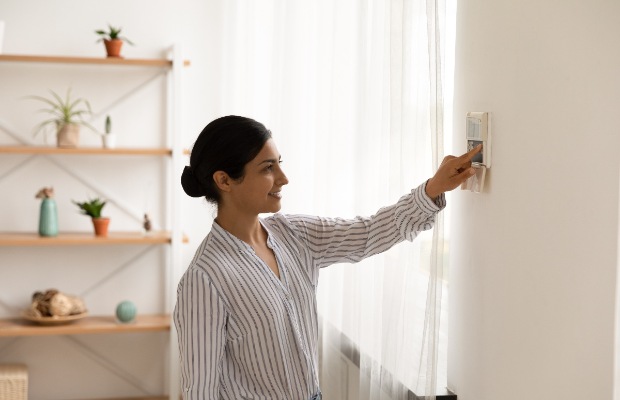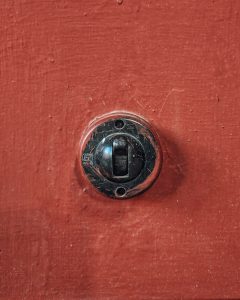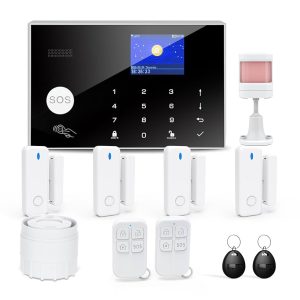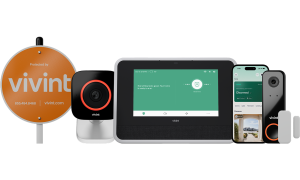Your home should be your safest place. But how sure are you that it really is?
Small changes can make a big difference in keeping your family and belongings secure. Imagine feeling completely at ease every time you walk through your front door. You’ll discover simple, effective ways to boost your home security without spending a fortune.
Ready to protect what matters most? Let’s dive in and make your home a fortress you can trust.
Assessing Home Vulnerabilities
Assessing your home’s vulnerabilities is the first step to better security. Knowing where risks exist helps you focus your efforts. This way, you can protect your family and belongings more effectively.
Identifying Common Entry Points
Most burglars enter through doors and windows. Check all doors for weak locks or gaps. Sliding doors often have poor locks or tracks that are easy to lift. Windows on the ground floor are easy targets. Look for broken seals or loose frames. Don’t forget less obvious points like pet doors or garage entrances. These spots need the same attention as main doors.
Evaluating Neighborhood Risks
Crime rates vary by neighborhood. Talk to neighbors about local incidents. Notice if streetlights are working at night. Dark areas can attract unwanted visitors. Watch for signs of vandalism or break-ins nearby. Consider the proximity to busy roads or parks that might bring more foot traffic. Understanding these risks helps you decide on extra security measures.
Upgrading Locks And Doors
Upgrading locks and doors is a straightforward way to boost your home security. Often, the weakest point in home safety lies at the entrance. Investing in better hardware can make a significant difference in protecting your family and belongings.
Choosing High-security Locks
Not all locks offer the same level of protection. High-security locks come with features like pick resistance, drill resistance, and reinforced bolts. These features make it much harder for intruders to break in.
Look for locks certified by recognized standards such as ANSI Grade 1 or 2. Deadbolt locks with a one-inch throw bolt provide stronger resistance against forced entry. You can also consider smart locks that allow you to monitor and control access remotely.
Think about how often you need to change or rekey your locks. High-security locks often come with restricted keys that only authorized locksmiths can duplicate. This adds an extra layer of control over who can access your home.
Reinforcing Door Frames
A strong lock is less effective if the door frame is weak. Reinforcing your door frame helps prevent it from being kicked open or pried apart. Simple upgrades can drastically improve its strength.
Adding a steel strike plate with long screws that reach the wall studs can hold the door better under force. You might also install a door jamb reinforcement kit that strengthens the entire frame around the lock area.
Check for gaps between the door and frame that could be exploited. Weather stripping or door sweeps can fill these spaces, making it harder for tools to slip through. Have you tested how much pressure your door frame can withstand?
Installing Security Systems
Installing security systems strengthens home safety by deterring intruders and alerting you to danger. Proper placement of cameras and sensors covers vulnerable areas effectively. Regular system checks ensure your home remains protected day and night.
Enhancing the security of your home is a crucial step in safeguarding your loved ones and possessions. Installing security systems can significantly boost your home’s defenses, providing peace of mind. But where do you start in choosing the right components and ensuring they work seamlessly together?Selecting Alarm Systems
Choosing an alarm system involves more than just picking the loudest siren. Look for systems with smart connectivity, enabling you to control and monitor your home remotely via a smartphone app. Consider systems that offer both audible alarms and notifications, ensuring you are alerted instantly wherever you are. Many modern alarms offer integration with other smart home devices, creating a cohesive security network. Think about your specific needs—do you want sensors on every window, or just the doors? Balancing thorough coverage with your budget is key. When I installed my first alarm system, I underestimated the importance of user-friendly technology. Opting for a system that was difficult to operate left me frustrated and less vigilant. Learn from my mistake and prioritize ease of use.Integrating Surveillance Cameras
Cameras are your eyes when you’re not home. Strategically placed, they deter potential intruders and provide evidence if needed. Position cameras at entry points, such as front and back doors, and any area hidden from street view. High-definition cameras with night vision ensure clear footage day and night. Wireless options offer flexibility in placement, but ensure they have a reliable power source. Consider models with motion detection and real-time alerts for added security. The first time I installed cameras, I overlooked the importance of securing the footage. Ensure your system is password-protected and consider cloud storage for easy access and backup. Are you ready to see your home security from a whole new angle?
Credit: www.instagram.com
Enhancing Outdoor Security
Enhancing outdoor security is a key part of protecting your home. The outside area is the first thing visitors and intruders see. Bright and well-kept surroundings can deter unwanted guests. Simple upgrades can make your home safer and more welcoming.
Improving Lighting
Good lighting reduces dark spots around your home. Well-lit areas make it harder for burglars to hide. Use bright, energy-efficient bulbs near doors and windows. Pathway lights help guide visitors safely. Consider timers or smart lights for convenience. Lights that turn on at dusk keep your home visible all night.
Using Motion Sensors
Motion sensors detect movement and trigger lights or alarms. They surprise anyone approaching your home. Place sensors near entrances, driveways, and walkways. This alerts you and scares off intruders. Modern sensors are easy to install and adjust. Choose models with adjustable sensitivity to avoid false alarms.
Maintaining Landscaping
Trim bushes and trees near windows and doors. Overgrown plants create hiding spots for intruders. Keep your lawn tidy and clear of clutter. Use thorny plants under windows to add a natural barrier. Regular maintenance improves visibility and safety. A neat yard shows that the home is cared for and watched.
Securing Windows
Windows are common entry points for intruders. Securing them strengthens your home’s safety. Simple upgrades can make a big difference. Small changes improve security and peace of mind.
Adding Window Locks
Window locks stop windows from opening easily. Choose locks that fit your window type. Sliding windows need different locks than casement windows. Lock types include key locks, latch locks, and pin locks.
Install locks at the meeting points of window sashes. Check locks regularly to keep them working well. Locked windows deter burglars and slow down forced entry.
Using Security Film
Security film adds a strong layer to glass. It holds broken glass together after an impact. This makes it harder for intruders to break through windows.
Apply security film on the inside surface of windows. It is almost invisible and does not block light. This film also protects against sharp glass shards during accidents.
Security film is affordable and easy to install. It adds extra protection without changing window appearance.

Credit: www.ellisandco.co.uk
Smart Home Security Devices
Smart home security devices offer an easy way to protect your home. They combine technology and convenience. These devices help you watch your house, control access, and get alerts fast. Many connect to your smartphone, letting you manage security anywhere. Installing smart devices increases safety without complicated setups.
Smart Doorbells
Smart doorbells show who is at the door through a camera. You see live video on your phone anytime. They have motion sensors that alert you of visitors or movement. Two-way audio lets you talk to people without opening the door. Some models record video clips for later review. Easy to install and use, smart doorbells improve home safety.
Remote Monitoring Options
Remote monitoring lets you watch your home from anywhere. Use apps to check live video feeds on your phone or tablet. Receive instant alerts if a sensor detects movement or a door opens. Some systems include cloud storage to save video recordings. Remote access helps you act quickly in case of emergencies. It gives peace of mind whether you are home or away.
Safety Habits And Practices
Developing strong safety habits and practices is key to protecting your home. Good routines help prevent accidents and reduce risks. Small actions every day build a secure environment. Consistent habits make your home less attractive to intruders. Teach family members the importance of safety. Practicing simple steps regularly can save lives and property.
Creating Emergency Plans
Plan what to do during emergencies like fire or break-ins. Discuss escape routes and safe meeting spots with your family. Practice these plans often so everyone knows their role. Keep emergency numbers easy to find and save them in phones. Prepare a basic emergency kit with first aid, water, and flashlights. Knowing the plan reduces panic and speeds up response.
Avoiding Common Mistakes
Many safety risks come from everyday oversights. Never leave doors or windows unlocked, even if leaving briefly. Avoid hiding keys outside; burglars know common spots. Do not ignore broken locks or damaged alarms. Avoid sharing your vacation plans on social media. Keep valuables out of plain sight through windows. These small steps lower chances of unwanted entry or accidents.
Working With Neighbors And Community
Improving home security often starts with building strong connections right where you live. When you work closely with your neighbors and the community, you create a network that watches out for each other. This shared vigilance can quickly spot unusual activities and help prevent crimes before they happen.
Joining Neighborhood Watch
Neighborhood Watch programs bring neighbors together to keep an eye on the community. Signing up means you’ll receive important updates about local safety issues and learn how to spot suspicious behavior. It’s not just about watching; it’s about feeling safer because you’re part of a team.
Imagine your street where everyone knows each other’s routines. If someone new appears or strange noise happens at night, neighbors can quickly alert each other or the police. This quick response often stops problems early.
Sharing Security Tips
Talking with your neighbors about security creates practical benefits. You can swap ideas on locking doors, setting alarms, or even using smart cameras. Sometimes, a tip from someone nearby can save you from a costly mistake.
Try organizing a casual meet-up or starting a group chat focused on safety. This way, you keep each other informed about recent break-ins, scams, or helpful products. When neighbors share what works for them, everyone gains better protection.

Credit: www.instagram.com
Frequently Asked Questions
How Can I Enhance Home Security On A Budget?
Start with strong locks on doors and windows. Use motion-sensor lights outside. Install security cameras or doorbell cameras. Trim bushes to eliminate hiding spots. Use timers for lights when away. These steps improve security without high costs.
What Are The Best Smart Security Devices For Homes?
Smart locks, video doorbells, and security cameras lead the list. They offer remote monitoring and alerts. Integrate with smart home systems for convenience. Choose devices with good reviews and easy installation. These enhance security and control from anywhere.
How Often Should I Update My Home Security System?
Update software and firmware regularly to fix vulnerabilities. Review your system annually to add new features. Replace outdated equipment every 5 to 7 years. Staying current ensures your security system remains effective and reliable.
What Role Do Outdoor Lights Play In Home Security?
Outdoor lights deter intruders by increasing visibility. Motion-activated lights startle and expose suspicious activity. Well-lit entryways reduce hiding spots. Use energy-efficient LED bulbs for cost savings. Proper lighting is a simple, effective security measure.
Conclusion
Improving home security starts with small, smart steps. Secure doors and windows first. Use good lighting around your house. Install alarms or cameras to watch your property. Keep your valuables out of sight. Stay aware of your neighborhood’s safety. Regular checks help spot weak spots early.
These actions help keep your home safe and give peace of mind. Protecting your home is a continuous effort worth doing. Stay safe, stay prepared.








